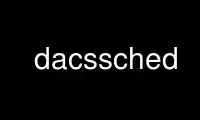
This is the command dacssched that can be run in the OnWorks free hosting provider using one of our multiple free online workstations such as Ubuntu Online, Fedora Online, Windows online emulator or MAC OS online emulator
PROGRAM:
NAME
dacssched - rule-based command scheduling
SYNOPSIS
dacssched [-h | -help] [-ll log_level] [-q] [{-r | -rules} rules_uri]
[{-s | -sched} sched_uri] [-v]
DESCRIPTION
This program is part of the DACS suite. It is a stand-alone program that neither accepts
the usual DACS command line options (dacsoptions) nor accesses any DACS configuration
files.
The dacssched command runs other programs when specified conditions have been met. It does
this by periodically examining a schedule, which, for each scheduled event, identifies the
necessary conditions and the command line to be executed should the conditions be
satisfied. Rules are stored separately from the schedule, although in a future version it
might be possible to contain them with their schedule.
Although dacssched is conceptually similar to cron(8)[1], atrun(8)[2], and other programs
used to schedule a command to be executed or a reminder to be sent at certain times or
dates, there are some important differences. First, because the DACS rule evaluation
engine is used, conditions much more broad and complex than simply the time or date can be
used to schedule a command - DACS expressions[3] are available. For instance, a rule to
manage automated file backup could be written to take into account context other than
simply the day of the week and the time of day, if necessary even running external
programs to assist in making the determination. Second, both a schedule and the rules
referenced by a schedule are accessed through the DACS virtual filestore, which means they
can be stored in file or database, retrieved by HTTP, and so on.
Note
Although this program may be useful, it is currently merely a prototype intended for
demonstration and experimentation purposes. Some configuration capabilities, features,
and security steps required by a production version have not been implemented. The
prototype must be invoked periodically; a production version would run in the
background and automatically rescan the schedule at a given frequency. Note that
because of its flexibility, the schedule must be polled at a suitable frequency - in
general, the program cannot compute when the next scheduled event will occur. Also
because events need not be triggered by a time or date, some events may need to
"self-disabling" so that they are not repeatedly executed unintentionally.
Operation
The program loads a schedule, which either comes from a default file or a location
specified on the command line. A schedule is an ordinary text file, each line of which is
either blank, a comment, or a scheduled event. The file is processed in the order in which
the events appear from the top. Initial whitespace on any line is ignored. A comment line
begins with a "#" character. A scheduled event consists of a name, followed by whitespace,
followed by a command. If name evaluates to True (i.e., it grants access), the command is
executed through system(3)[4]. If rule evaluation fails because of an error, the event is
not executed. Events are not removed from the schedule after their command has been
executed.
A name, which must begin with a slash, has no significance to dacssched; it is simply a
label that is used to identify the rule to apply and is matched against a rule's service
element.
Here is a simple schedule containing one event:
# A simple schedule
/setdate /usr/local/sbin/rdate -a
If the condition labelled /setdate is True the specified command will be executed.
A simple rule such as the following might be associated with the event:
<acl_rule status="enabled">
<services>
<service url_pattern="/setdate"/>
</services>
<rule order="allow,deny">
<allow>
time(hour) eq 2 and time(min) eq 0
</allow>
</rule>
</acl_rule>
This rule enables the event /setdate at 2:00am every day. We will assume that the schedule
is processed exactly once per minute.
Internally, dacssched converts the scheduled event above into the expression:
rule("/setdate", rule_uri)
(where rule_uri specifies the ruleset to use) and then evaluates the expression. Please
refer to the rule predicate[5] for additional information.
OPTIONS
The arguments are processed as they are examined (left-to-right) and their ordering can be
significant.
By default, the program will look for a schedule in the file
${Conf::DACS_HOME}/dacssched/sched. (default: /usr/local/dacs/dacssched/sched) The default
location for the rules is ${Conf::DACS_HOME}/dacssched/acls. (default:
/usr/local/dacs/dacssched/acls)
The following command line flags are recognized:
-h
Prints the usage blurb.
-ll log_level
Set the debugging output level to log_level (see dacs(1)[6]). The default level is
warn, and the -v flag bumps the level to debug or trace.
-q
Be quiet, except for error messages. The -v and -ll flags are independent of this.
-r rule_uri
-rules rule_uri
This flag specifies the ruleset to be used. It can be an absolute pathname or a URI in
the syntax of the VFS[7] configuration directive. Examples:
-r "[acls1]dacs-fs:/local/acls"
-rules /usr/local/myrules
-s sched_uri
-sched sched_uri
This flag specifies the schedule. It can be an absolute pathname or a URI in the
syntax of the VFS[7] configuration directive.
-v
Increase the level of debugging output. The flag may be repeated.
DIAGNOSTICS
The program exits 0 if everything was fine, 1 if an error occurred.
Use dacssched online using onworks.net services
